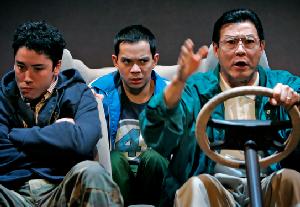SITE GUIDE
SEARCH
REVIEWS
FEATURES
NEWS
Etcetera and
Short Term Listings
LISTINGS
Broadway
Off-Broadway
NYC Restaurants
BOOKS and CDs
OTHER PLACES
Berkshires
London
California
DC
Philadelphia
Elsewhere
QUOTES
On TKTS
PLAYWRIGHTS' ALBUMS
LETTERS TO EDITOR
FILM
LINKS
MISCELLANEOUS
Free Updates
Masthead
Writing for Us
A CurtainUp Review
Durango
By Elyse Sommer
|
Why did I want so little? Where did I learn to want so little for myself?—Boo-Seng
|

James Yaegashi as Isaac Lee, Jon Norman Schneider as Jimmy Lee, James Saito as Boo-Seng Lee in Durango
(Photo: Michal Daniel)
|
This is the third play by Julia Cho I've seen in three years. All are linked by their Southwest settings and are peopled with characters who in the course of less than two hours unpack a lot of pain. The label "emerging playwright" still fits Ms. Cho in that she hasn't come up with a flawless play yet, but she is nevertheless well on the way towards building an impressive body of contemporary, interesting dramas. These dramas involve a group of as yet not much written about Americans which provide actors with roles to dig into, and audiences with something to think about.
Like BFE, her last play, Durango, benefits enormously from Chay Yew's low key, sensitive direction. James Saito, James Yaegashi and Jon Norman Schneider fashion rich individual and group portraits of a Korean-American father and his two sons: Saito as the tightly strung, driving father; Yaegashi as the completely Americanized Isaac, the rebellious oldest son; and Schneider, especially outstanding as the loving, sexually confused thirteen-year-old Jimmy, who at one point does an extraordinary monologue as his dead mother. Ross Bickell and Jay Sullivan tidily fill out the cast of characters, each taking on a double role. Thanks to Dan Ostling's spare but versatile set, atmospherically lit by Paul Whitaker, this is also a handsome production that creates a variety of settings with utmost economy.
The first Lee we meet is twenty-one-year-old Isaac, accompanying himself on his guitar with a song (written by the playwright) about a deserted Main Street and expressing a longing for "hitting the road." The lyrics serve as a signal for the road trip on which he unwillingly accompanies his father and kid brother.
The destination of that road trip during which the Lees' individual and familial problems are unpacked is Durango, a legendary American resort. It's one of many American landmarks visited by car when Boo Seng's wife (an arranged, loveless marriage) was still alive — all part of his determined effort to imprint the family with the American ethos.
This particular trip is Boo Seng's way of responding to a sudden upheaval in his life that he's unable to share with his sons even though it prompts a need to be with them. You see, as Boo Seng was focused on making his American Dream plans materialize for his boys, he failed to see that he was about to be swept up, not in the American Dream but in an increasingly prevalent American nightmare: the sidelining of thousands of American workers. We see him unceremoniously dismissed by a company to which he's given loyal service for twenty years, several years short of retiring with full pension benefits. It's not a job he loved, but one that was part of his vision which, as for many first generation Americans, meant sacrificing his personal desires to insure his children's happiness and success.
Though Boo Seng is steeped in solitary suffering about his situation he still feels confident that his plans for Isaac to become a doctor and for Jimmy's success on the school swim team to help him get a scholarship to a top college. However, as he wore blinders about his endangered job, so he fails to see that both Isaac and Jimmy are also lonely abd in crisis. Isaac seeks answers with his guitar. Sensitive Jimmy seeks solace for his true yearnings by using his drawing talent to create his own super hero universe (his Red Angel super hero springs to abstract life courtesy of Jay Sullivan).
As you can surmise, the road to Durango is paved with tension, sorrow and regret. If you saw Architecture of Loss or BEO you won't expect Ms. Cho to let the characters cathartically spill out their despair and then embrace for a happy ending. She's too tough a writer to wind things up in what would admittedly be a more definitely upbeat ending. She allows secrets and feelings to be flung out of the closet, but closes the door again. It is kept a sliver ajar and Durango is an unremitting dour play. Its landscape has moments of being flooded with sunshine, so a lot of what leads up to that less than happily ever after ending includes some entertaining, touching and even funny scenes.
In its continuing effort to make vital new plays affordable for everyone, Durango has a $10 ticket price every Thursday during its run. Surely, one of the best buys in town.
LINKS
The Architecture of Loss
BFE
| Durango Playwright: Julia Cho Director: Chay Yew Cast: Ross Bickell (Jerry, Ned), James Saito (Boo-Seng Lee), Jon Norman Schneider (Jimmy Lee), Jay Sullivan (Red Angel, Bob), James Yaegashi (Isaac Lee) Sets: Dan Ostlin Costumes: Linda Cho Lights: Paul Whitaker > Sound Design & Additional Music: Fabian Obisp Original Songs: Julia Cho Running Time: 1 hour and 40 minutes without an intermission Public Theater/Martinson, 420 Lafayette St. 212-967-7555 From November 7 to December 10, 2006; opening November 20, 2006 Tue & Sun at 7pm; Wed to Sat at 8pm; Sat & Sun at 2pm Tickets:$50; $20 quicktix and $10 on Thursdays Reviewed by Elyse Sommer based on November 16th performance |

Easy-on-the budget super gift for yourself and your musical loving friends. Tons of gorgeous pictures.

Leonard Maltin's 2007 Movie Guide

At This Theater

 >
>

